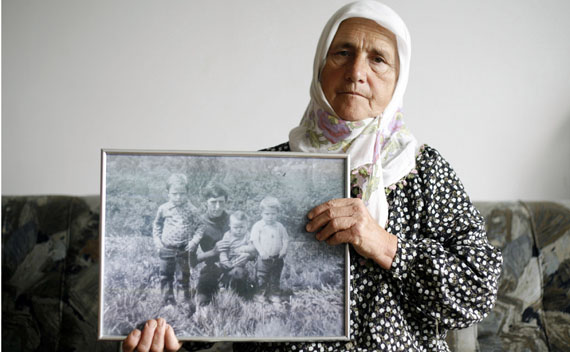The Trials of International Tribunals
More on:

Champions of international justice have been heartened by recent events. Last week, the Serbian government finally arrested Ratko Mladic, remanding the butcher of Srebenica to The Hague to stand trial before the International Criminal Tribunal for the former Yugoslavia (ICTY). On the same day, the International Criminal Tribunal for Rwanda (ICTR) indicted a leading Tutsi genocidaire, Bernard Munyagishari. In the coming days, the International Criminal Court (ICC) is expected to indict Libyan dictator Muammar al-Qaddafi on charges of crimes against humanity, as requested by Chief Prosecutor Luis Moreno-Ocampo. After years of impunity, might the long arm of the law finally be catching up with perpetrators of mass atrocities?
But before getting too excited, we need to put these victories in perspective. International criminal tribunals are rife with shortcomings—and should remain only a secondary option, when local forms of delivering justice are impossible.
Consider the uneven record of ICTY and ICTR. Both tribunals took years to establish and begin criminal proceedings, and neither has enjoyed the resources or scope to try but a handful of those accused of atrocities. In a decade and a half, ICTY has managed to sentence 64 defendants and acquit 12 (with three dozen trials still in its docket). ICTR’s record is even more modest, having sentenced 46 and acquitted 8 (with two dozen trials still pending). The inability of the Rwanda court to try more than a handful of alleged genocidaires left thousands languishing in jail for years, until they were released to face informal modes of justice. Beyond these operational difficulties, both courts have suffered attacks on their illegitimacy from supporters of the accused.
Nor has the International Criminal Court (ICC) done enough to fill the vacuum. The Rome Statute, negotiated in 1998, created the ICC as a permanent judicial body with jurisdiction over four specific atrocity crimes: genocide, ethnic cleansing, war crimes, and crimes against humanity. The ICC has jurisdiction only when a state is unable or unwilling to conduct its own investigation. The ICC began operations in 2002. It did so without the participation of the United States, concerned that the Court’s independent prosecutor, operating outside the consent of the UN Security Council (UNSC), could launch politically motivated, unwarranted prosecutions, effectively violating U.S. sovereignty.
The ensuing years suggested that U.S. fears were overblown: the court has taken a cautious stance in choosing its cases. On the other hand, the high hopes of ICC enthusiasts have been disappointed. To date, the Court has exercised jurisdiction in only six instances. In three—Uganda, Democratic Republic of the Congo, and the Central African Republic—that referral came from the state itself. In the cases of Kenya and Libya, the ICC Prosecutor himself took the initiative. In the case of Darfur, the ICC responded to the UNSC referral.
The ICC’s heavy focus on African countries has fueled criticism of postcolonial bias among many African commentators. The Court has also been beset by internal management problems and often lacked sufficient external expertise to prosecute senior leaders. Even more frustrating is the failure to apprehend indicted suspects—a weakness that reflects less on the ICC than on the most powerful UN member states, which have lacked the political will to enforce the court’s writ. Despite the active support of the Ugandan government, for example, the notorious rebel leader Joseph Kony remains at large. Potentially most damaging has been the failure of the UNSC to do anything significant to bring the Sudanese leader Omar al-Bashir to justice. Despite his indictment, Bashir has continued to gallivant around Africa and Arabia, even to states that are party to the Rome Statute, like Chad and Kenya. If the ICC experiences the same difficulty in bringing Qaddafi to justice, it will suffer another grievous blow to its credibility.
Given the pitfalls of international tribunals, a number of international lawyers are calling for greater investments in prosecuting human rights abuses at the national level. In a thoughtful new Council Special Report, David A. Kaye, the executive director of UCLA Law School’s international human rights programs, suggests that the United States and other international actors might get more bang for the buck in building up national systems of domestic accountability.
As Kaye explains in Justice Beyond The Hague: Supporting the Prosecution of International Crimes in National Courts, local justice has distinct advantages to international tribunals. Among other things, it brings accountability to the local level, increasing the perceived legitimacy of prosecutions. It allows nationals themselves to remove and stigmatize officials. And it helps to restore political stability in post-conflict societies, while rebuilding local judicial institutions. Accordingly, Kaye recommends that the United States government embrace a strategy to work with other wealthy donor countries, to help develop accountability mechanisms and shore up domestic justice structures in developing countries.
This is sound advice, subject to one big caveat: such an approach will only work when there is a local partner government willing to take such judicial proceedings seriously. It is not likely to work in a case like Sudan or Libya, where a criminal government is entrenched, or in cases like former Yugoslavia, where no credible government exists to prosecute mass atrocities. The logical conclusion is that international justice will continue to rely on the ICC—or other, ad hoc bodies established by the UN Security Council—as complements to national judicial processes. In the case Ratko Mladic, for example, ICTY will at last provide the relatives of his victims with the solace that justice deferred was not justice denied.
More on:
 Online Store
Online Store